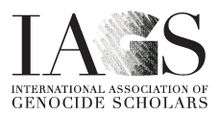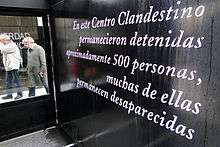International Association of Genocide Scholars
The International Association of Genocide Scholars (IAGS) is an international non-partisan organization that seeks to further research and teaching about the nature, causes, and consequences of genocide, including the Holocaust,[1] and to advance policy studies on the prevention of genocide.[2][3][4][5][6] The association, founded in 1994 by Israel Charny, Helen Fein (its first president), Robert Melson, and Roger Smith, meets to consider comparative research, recent works, case studies, the links between genocide and other human rights violations, and prevention and punishment of genocide, information which is published in the official journal of the association. A central aim of the association is to draw academics, activists, artists, genocide survivors, journalists, jurists, and public policy makers into the study of genocide, with prevention as the end goal. Membership is open to interested persons worldwide.

In 1997, the association unanimously passed a formal resolution affirming the Armenian Genocide,[7][8] and also sent an open letter to the Prime Minister of Turkey.[9] In December 2007 the organization passed another resolution reaffirming the Armenian Genocide and officially recognizing both the Greek and Assyrian Genocides.[10]

The official peer-reviewed academic journal of the association is called Genocide Studies and Prevention.[11]
Presidents
The following persons are or have been president of the association::
- Henry Theriault (2017-Present)
- Andrew Woolford (2015-2017)
- Daniel Feierstein (2013-2015)
- Alexander Hinton (2011-2013)
- William Schabas (2009-2011)
- Gregory H. Stanton (2007-2009)
- Israel W. Charny (2005-2007)
- Robert Melson (2003-2005)
- Joyce Apsel (2001-2003)
- Frank Chalk (1999-2001)
- Roger Smith (1997-1999)
- Helen Fein (1995-1997)
References
- "IAGS". Homepage. International Association of Genocide Scholars: History. Archived from the original on 11 September 2017. Retrieved 21 April 2017.
- Forsythe, David P. (2009). Encyclopedia of Human Rights. Oxford University Press. pp. 4–. ISBN 978-0-19-533402-9.
- Totten, Samuel (2007). The Prevention and Intervention of Genocide: An Annotated Bibliography. Routledge. pp. 1097–. ISBN 978-0-415-95358-0.
- Totten, Samuel; Pedersen, Jon E. (January 2012). Educating about Social Issues in the 20th and 21st Centuries: A Critical Annotated Bibliography. IAP. pp. 422–. ISBN 978-1-61735-572-1.
- Bartrop, Paul R. (30 July 2012). A Biographical Encyclopedia of Contemporary Genocide. ABC-CLIO. p. 389. ISBN 978-0-313-38679-4.
- Ball, Howard (2011). Genocide: A Reference Handbook. ABC-CLIO. pp. 271. ISBN 978-1-59884-488-7.
- Lewy, Guenter (15 April 2012). Essays on Genocide and Humanitarian Intervention. University of Utah Press. p. 5. ISBN 978-1-60781-187-9.
- MacDonald, David B. (2008). Identity Politics in the Age of Genocide: The Holocaust and Historical Representation. Routledge. p. 135. ISBN 978-0-415-43061-6.
- Henham, Ralph; Behrens, Paul (1 February 2013). The Criminal Law of Genocide: International Comparative and Contextual Aspects. Ashgate Publishing. p. 17. ISBN 978-1-4094-9591-8.
- International Association of Genocide Scholars Archived 2008-02-27 at the Wayback Machine
- "IAGS Journal". Homepage. International Association of Genocide Scholars. Archived from the original on 15 September 2017. Retrieved 22 March 2015.